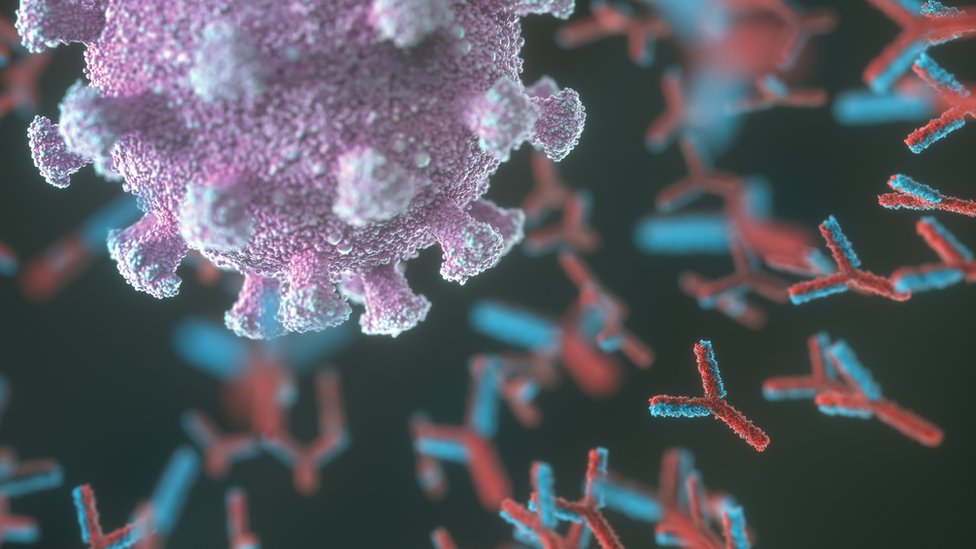That Elusive Herd Immunity : Declining Post-COVID Antibodies
 |
| Y-shaped antibodies stick to the surface of viruses Getty |
"We can see the antibodies and we can see them declining and we know that antibodies on their own are quite protective.""On the balance of evidence I would say, with what we know for other coronaviruses, it would look as if immunity declines away at the same rate as antibodies decline away, and that this is an indication of waning immunity at the population level.""Seasonal coronaviruses that circulate every winter and cause common colds can reinfect people, after six to 12 months, and we suspect that the way that the body reacts to infection with this new coronavirus is rather similar to that.""We don't yet know what level of antibody is needed in a person's blood to protect them from infection or re-infection from SARS-CoV-2, but of course that level is a crucial thing to begin to understand.""A good vaccine may well be better than natural immunity."Wendy Barclay, head, Department of Infectious Disease, Imperial College London
 |
| Study: Covid Population Immunity May Not Last Still from Video, Reuters |
According to a study the results of which have been released this week, antibodies against the novel coronavirus were seen to rapidly decline in the British population over the summer months. It seems after all that the expected protection following infection may not in fact be long-lasting, a reality that raises the prospect of community immunity on the wane anywhere. Imperial College London conducted the study, involving 365,000 people, finding antibodies in the population fell by over a quarter in a three-month period.
The findings suggest a "rapid" decline in immunity, so that even should a successful vaccine be discovered, it may have to be administered as frequently as twice yearly. By June following the first wave of the pandemic in Britain a mere six percent of the population appears to have developed antibodies. The study showed that even this inadequate number had dropped three months later to 4.4 percent by September, most of the decline occurring within six weeks.
Britain was "miles off" achieving herd immunity, according to the scientists studying the issue, and that herd immunity may never be achieved without the use of an effective and safe vaccine. Among those most vulnerable to serious illness from COVID-19, the largest fall in antibodies was identified; those aged 75 and older where antibody levels fell by 39 percent. On the other hand, a drop of 15 percent was seen in those aged between 18 and 24.
It was not yet known what level of antibody response would be required to protect against reinfection; remaining possible that even low levels of antibodies would offer some level of protection. Researchers stressed however, that the findings suggest a significant rapid decline in immunity which raises the prospect that those infected could conceivably repeatedly suffer from infections in COVID waves to follow. This is a scenario starkly resembling the common cold infections which occur regularly.
Even should a successful vaccine be developed, that vaccine might have to be administered as frequently as every six months, an increase in the scale of the challenge to overcome the direct threat of the coronavirus to human health and longevity. Even so, researchers have reached the consensus of opinion that vaccines could prove to be more effective than hopes for natural immunity to develop.
The study effectively validated findings from similar surveys that took place in Germany where it was found that the vast majority of people failed to develop COVID-19 antibodies -- even those resident in hot spots for the disease; furthermore antibodies that did develop might fade quickly. Tarik Jasarevic, a spokesman for the World Health Organization, stated that uncertainty over how long immunity could last and the fact that most people never acquired antibodies in the first place, indicated the need to break transmission chains.
"Acquiring this collective immunity just by letting virus run through the population is not really an option", he declared at a briefing in Geneva. "The need for a vaccine is still very large if you want to try and get a large level of protection in the populace", added Graham Cooke, another Imperial infectious diseases expert. Dr.Barclay noted that the rapid waning of antibodies would not necessarily bear implications for the efficacy of vaccine candidates in clinical trials currently underway.
 |
Labels: Britain, COVID-19, Declining Antibodies, Research, Survey

0 Comments:
Post a Comment
<< Home